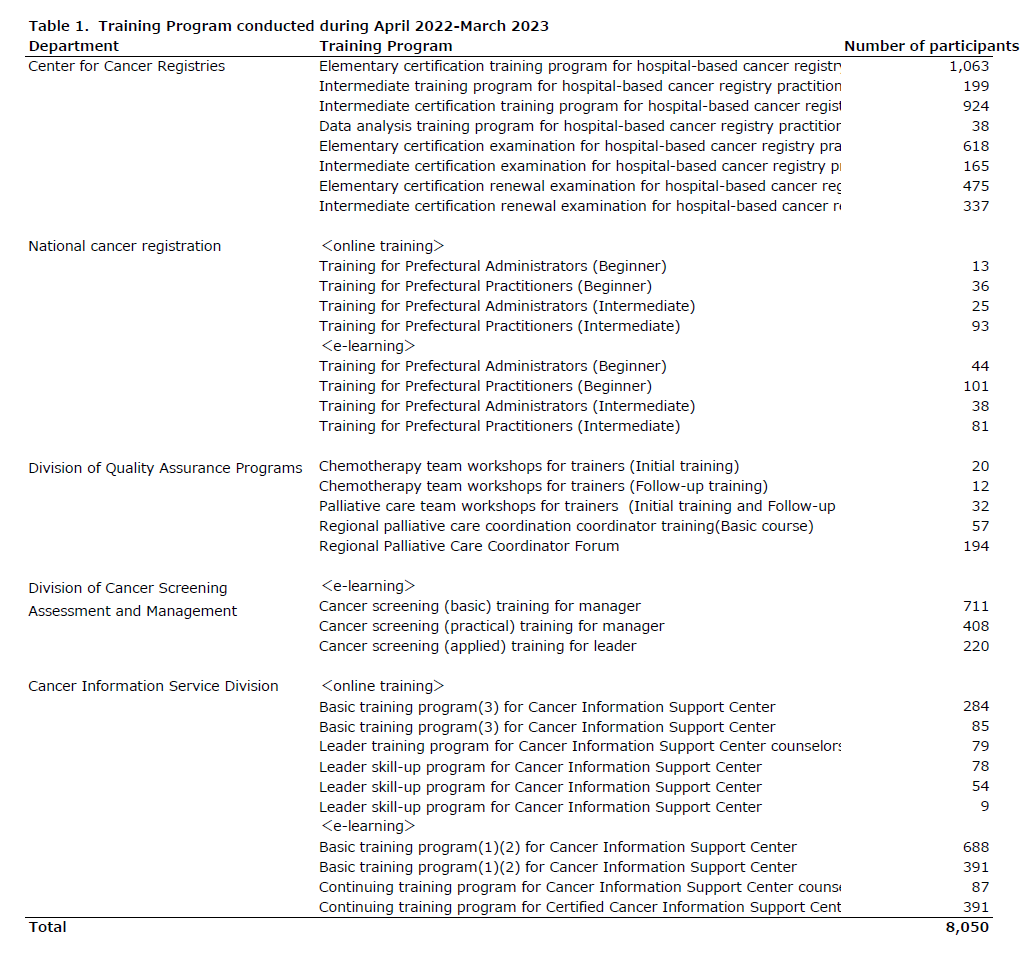Home > Divisions & Departments > Division of Quality Assurance Programs > Projects
Projects
Regional Care Network Section (RCNS)
Regional Care Network Section serves as a hub for the nationwide cancer medical network, with the aim of improving the quality of cancer care in Japan.
Networking among Designated Cancer Care Hospitals
RCNS holds the Designated Cancer Care Hospitals Liaison-council and the Palliative Care Committee (a subsidiary organization) to enhance partnerships for cancer control in Japan.
Serving as the secretariat of Japanese Association of Clinical Cancer Centers, RCNS is enhancing cooperation among specialized cancer treatment hospitals.
Networking among Regional Palliative Care
To enhance palliative care throughout the region, RCNS is dedicated to promoting the creation of face-to-face interactions and establishing visible relationships at the secondary medical level. Additionally, RCNS collaborates to solve regional issues and nurtures skilled professionals committed to creating a comprehensive network of medical institutions in the region.
Education
The RCNS provides and evaluates various oncology professional training programs about up-to-date information on cancer screening, treatment, care, and cancer registration for physicians, nurses, pharmacists, cancer information (CI) specialists and cancer registrars. The RCNS provides multidisciplinary training programs for Palliative Care Teams and Chemotherapy Teams. To develop leaders in each prefecture, RCNS holds leadership training programs for skilled physicians, nurses, pharmacists and CI specialists. (Table 1)
The Multipoint Joint Medical Conference
The Multipoint Joint Medical Conference is a regular event that connects 31 medical facilities across the country, such as cancer centers and general hospitals, through a web conferencing system. This conference focuses on various medical topics and is designed for a diverse audience of healthcare professionals, including doctors, nurses, pharmacists, radiology technicians and clinical technologists.
Pathology Consultation Section(PCS)
The mission of this section is to support and promote appropriate diagnoses of cancer though our consultation system of pathology diagnosis. In this consultation system, the difficult cases for pathological diagnoses, such as rare cancers or tumours that require special analysis, are referred to consultant pathologists who are experts in the field and their diagnostic opinions are returned to a client pathologist.
Support and promotion of the pathological diagnosis
- The system provides support to pathologists involved in cancer treatment, particularly at the hospitals designated by the Ministry of Health, Labour and Welfare.
- A pathologist with expertise in the area is selected as a consultant to provide a helpful diagnostic opinion for difficult-to-diagnose cases sent to the system.
- No fee is requested to the client in this consultation system.
- The consultant's diagnostic opinion is returned to the client approximately two to three weeks after receipt of the request, depending on the nature of the request.
- In addition to sending glass specimens, the system also accepts specimens digitised as virtual slides (Launched in April 2008).
- An online system for requesting and reporting pathological diagnoses has been used to reduce turn-around-time. (Launched in July 2007).
Rare Cancer Support Section (RCSS)
The RCSS supports the various activities of the Rare Cancer Center, an affiliate of the National Cancer Center Japan, mainly in epidemiology and social medicine. In the RCSS, basic/epidemiological data on rare cancers in Japan are collected and analyzed to improve the medical system for rare cancers in the country, which are associated with various challenges. It also assesses the suitable treatment style (the necessary medical facility, necessary for centralization, etc.) for each type of rare cancers based on its clinical/biological characteristics.
-The development and description of quality indicators for rare cancer
-The identification and disclosure of rare cancer cases and clinical settings in the designated cancer hospitals: "Find a hospital for rare cancer care" (In Japanese, link to external site)
-The development of definitions and classifications for rare cancers
Research activities
Mortality Follow-back Survey
To assess the quality of death and dying, RNCS has been conducting a nationwide mortality follow-back survey since 2018. This survey identifies a need for improved end-of-life care for patients at the end of life in Japan.

